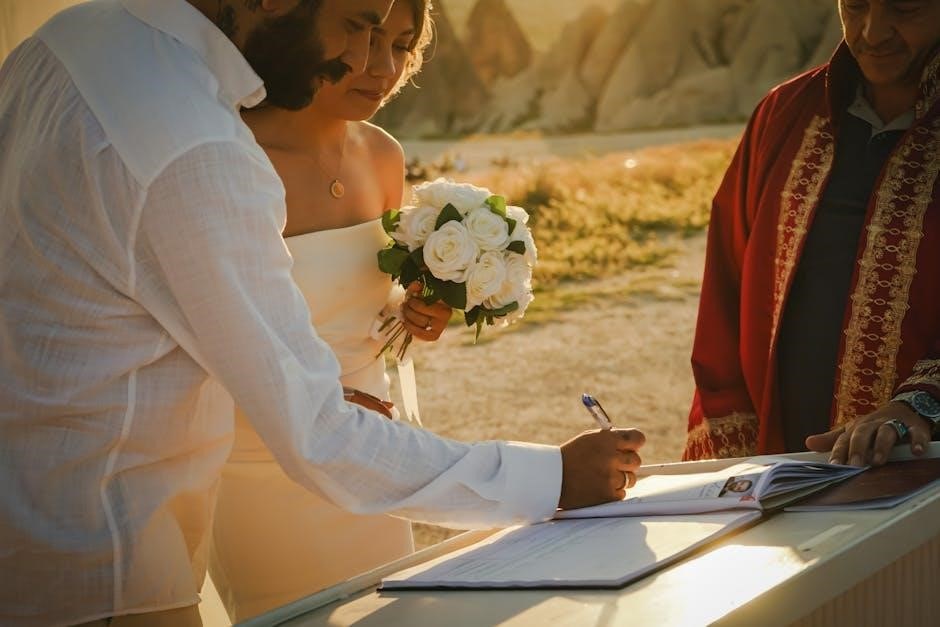wedding officiant questionnaire pdf
A wedding officiant questionnaire is a vital tool designed to gather essential information about the couple, their preferences, and ceremony details․ It ensures a personalized, smooth, and meaningful wedding experience for all parties involved․
Essential Sections of a Wedding Officiant Questionnaire
A comprehensive questionnaire includes couple’s information, ceremony details, preferences, vows, readings, and special requests․ It also covers logistical and personal elements to ensure a tailored and meaningful ceremony experience․
2․1․ Couple’s Information and Background
This section is crucial for understanding the couple’s personal story and relationship dynamics․ It includes questions about their names, contact details, and how they met․ Additionally, it asks about their engagement story, shared values, and vision for the marriage․ Such details help the officiant craft a personalized and meaningful ceremony․ It also inquires about any funny or heartwarming anecdotes to incorporate, making the ceremony unique and memorable․ This section ensures the officiant connects with the couple on a deeper level, creating a authentic and engaging experience for all attendees․ By gathering this information, the officiant can tailor the ceremony to reflect the couple’s personality and love story, ensuring a truly special occasion․
2․2․ Ceremony Details and Preferences
This section focuses on the specifics of the ceremony, ensuring every detail aligns with the couple’s vision․ It includes questions about the ceremony structure, such as the order of events, readings, and music choices․ Couples are asked about their preferences for traditional or non-traditional elements, such as unity ceremonies or special rituals․ The questionnaire also inquires about participants, like readers, musicians, or witnesses, and their roles․ Additionally, it asks for any funny or heartfelt anecdotes to include, making the ceremony unique and engaging․ The section also covers logistical details, such as the arrival plan for the officiant and the couple, ensuring a smooth and stress-free experience․ This comprehensive approach guarantees the ceremony reflects the couple’s personality and style, creating a memorable and authentic celebration․
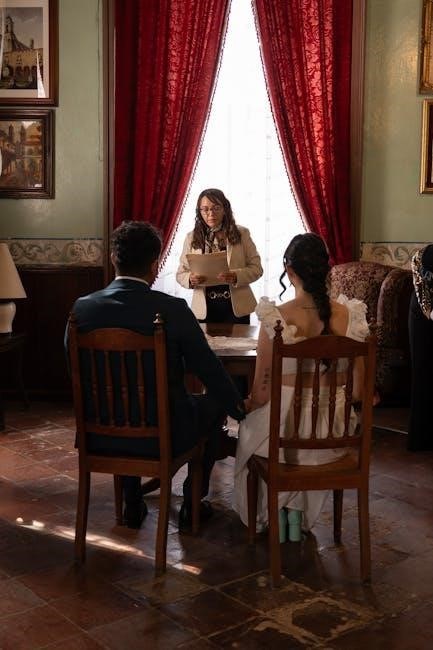
Benefits of Using a Wedding Officiant Questionnaire
A wedding officiant questionnaire ensures comprehensive planning, personalizes the ceremony, and reduces stress by gathering all necessary details upfront, creating a smooth and memorable experience for the couple and officiant alike․
3․1․ Ensuring Comprehensive Ceremony Planning
A wedding officiant questionnaire ensures that no detail is overlooked, providing a comprehensive understanding of the ceremony structure․ By gathering information on the order of events, readings, music, and rituals, it allows the officiant to craft a cohesive and meaningful service․ This tool helps identify the couple’s preferences, ensuring that their vision is accurately reflected in the ceremony․ It also covers logistical details, such as the arrival plan and special requests, which are crucial for a smooth execution․ By addressing these aspects upfront, the questionnaire minimizes the risk of last-minute surprises and ensures that the ceremony is both personalized and well-organized․ This level of preparation not only benefits the couple but also enhances the overall experience for guests․
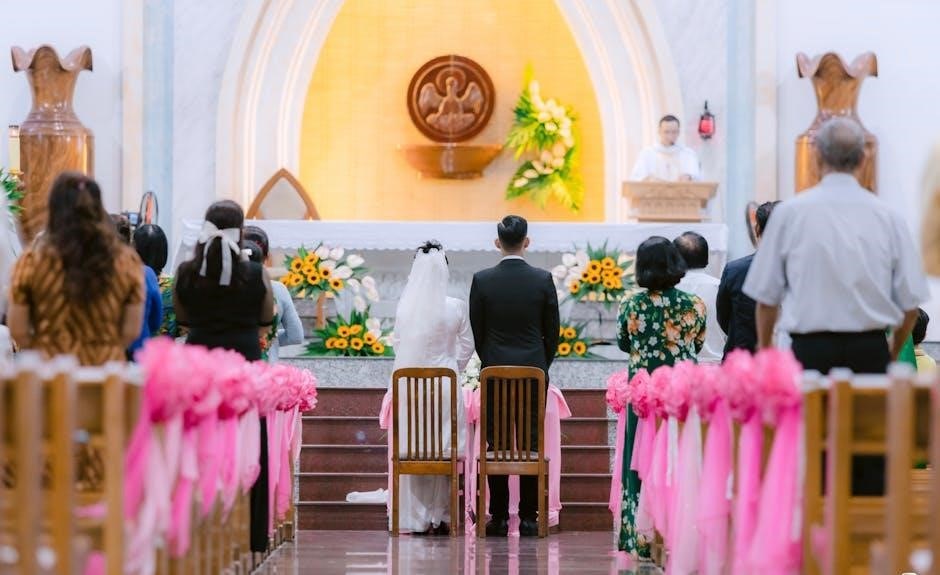
3․2․ Personalizing the Ceremony Script
A wedding officiant questionnaire is instrumental in personalizing the ceremony script, ensuring it reflects the couple’s unique story and preferences․ By asking about personal anecdotes, special memories, and custom vows, the officiant can craft a meaningful and heartfelt narrative․ This tool also helps incorporate rituals, readings, and music that resonate with the couple’s cultural or religious background, making the ceremony authentic and representative of their identity; Additionally, it allows the officiant to tailor the tone and language to match the couple’s style, whether formal, casual, or humorous․ This level of personalization ensures the ceremony feels intimate and memorable, creating a unique atmosphere that honors the couple’s love story and commitments․
3․3․ Reducing Wedding Day Stress
A wedding officiant questionnaire plays a significant role in reducing wedding day stress by ensuring all details are clearly communicated and organized․ By gathering essential information upfront, the couple and officiant can avoid last-minute misunderstandings or miscommunications․ The questionnaire helps outline the ceremony structure, timing, and logistics, providing a roadmap for the officiant to follow; This clarity allows the couple to focus on enjoying their special day rather than worrying about the flow or content of the ceremony․ Additionally, having a comprehensive plan in place gives both the couple and the officiant peace of mind, knowing that every aspect has been thought through and prepared․ This proactive approach minimizes stress, ensuring the wedding day is joyful and memorable․
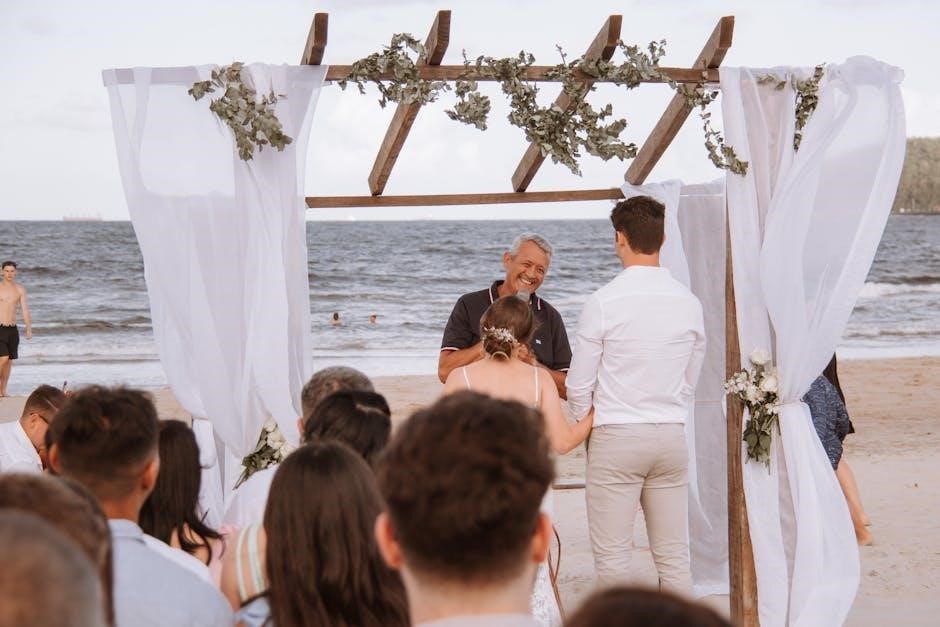
Tips for Creating an Effective Wedding Officiant Questionnaire
Crafting a clear and concise questionnaire ensures essential details are captured․ Use templates for efficiency, keep it user-friendly, and review it with the couple to avoid misunderstandings․
4․1․ Utilizing Templates for Efficiency
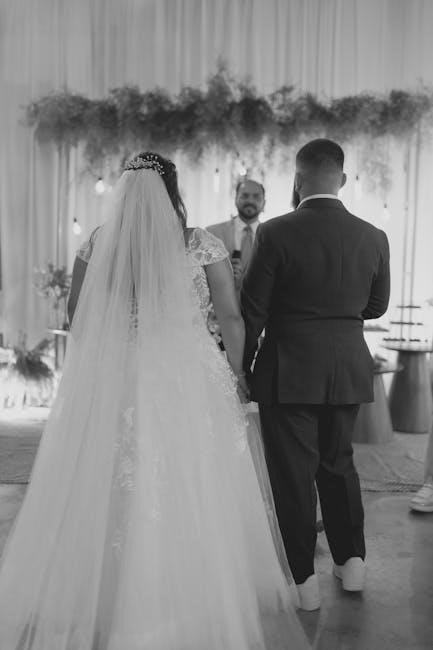
Using pre-designed wedding officiant questionnaire templates streamlines the process, saving time and effort․ These templates typically include essential sections such as couple’s information, ceremony details, and preferences, ensuring nothing is overlooked․ They offer a structured format, making it easier for officiants to gather necessary data efficiently․ Additionally, templates can be customized to fit specific needs, allowing for personalization while maintaining organization․ Many online resources provide downloadable and editable templates, catering to various wedding styles and requirements․ By leveraging these tools, officiants can focus on crafting a meaningful ceremony rather than starting from scratch․ Templates also help in maintaining consistency and professionalism, which are crucial for delivering a flawless wedding experience․ Overall, they serve as a practical solution for officiants aiming to create a well-planned and personalized ceremony․
4․2․ Ensuring the Questionnaire is User-Friendly
Creating a wedding officiant questionnaire that is user-friendly is crucial for gathering accurate and detailed information․ This involves designing the document with clarity and simplicity, ensuring couples can easily navigate and complete it․ Using clear headings, bullet points, and checkboxes can make the process less overwhelming․ Additionally, providing brief instructions at the beginning helps guide the couple through each section․ Keeping questions concise and avoiding unnecessary jargon ensures the questionnaire is accessible to all․ Organizing the questions in a logical flow, from general to specific details, also enhances usability․ Finally, offering the option to save progress and return later can reduce stress for busy couples․ By prioritizing user-friendliness, officiants can ensure they receive the information needed to craft a meaningful and personalized ceremony․ This approach fosters collaboration and sets the foundation for a successful wedding celebration․
4․3․ Reviewing and Finalizing with the Couple
After the couple completes the wedding officiant questionnaire, it is essential to review and finalize the details together․ This step ensures that all information is accurate and aligns with their vision for the ceremony․ Officiants should schedule a meeting or call to discuss the questionnaire responses, addressing any unclear or missing information․ This review process allows for open communication, helping to clarify preferences, traditions, or specific requests the couple may have․ It also provides an opportunity to make adjustments to the ceremony script or flow․ Finalizing the questionnaire together builds trust and ensures everyone is on the same page․ By doing so, officiants can deliver a ceremony that truly reflects the couple’s love story and unique style, making the wedding day even more special and memorable․ This collaborative approach is key to creating a seamless and heartfelt celebration․
